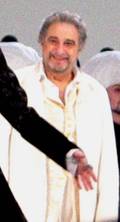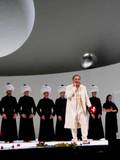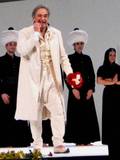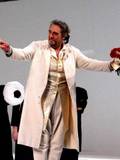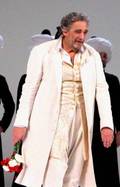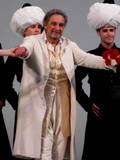I have a strange relationship with Handel. There is nothing of his, that I have heard, that I don't like, except for Concerto Grosso Opus 6 No 6 which was a set work at O-Level and I hated with a vengeance, only to discover years later that there's nothing wrong with the actual concerto, just a really bad recording that was owned by the music department at school that could have put me off Handel for life. For years, I was convinced I didn't like Handel, apart from Messiah, of course, and the Water Music, and Music for the Royal Fireworks, and Zadok the Priest, and the Arrival of the Queen of Sheba, oh, and all those arias, like Ombra Mai Fu, Where'er You Walk, Waft Her Angels, and, oh dammit, those operas (and operas masquerading as oratorios). Not that I have heard very many of his operas, but what I have heard, I do like.
I received a pocket Kobbé for Christmas which not only mentions Handel but also gives a summary of Tamerlano,which is two steps better than my father's old 'Complete Kobbé' which doesn't even mention Handel. For a long time, most of Handel's operas were unperformed. There is conflicting narrative about when they started to be revived; some sources mention the 1920s, some the 1960s. A couple of years ago someone remarked that seven different Handel operas were performed in one season in London, which apparently has not happened anywhere in modern times.
I encounter people almost daily on the internet who contend or imply that Handel isn't really opera or 'doesn't matter', which alternatively saddens and maddens me. I can understand why people, steeped in classical grand opera, can have difficulty adjusting to the strict conventions of opera seria, with its structure of recitative/da capo aria, with characters exiting in turn, to be replaced by another with a different plot twist. There is also a challenge in staging a Handel opera successfully; the da capo aria does lend itself to park-and-bark (although I don't think that 'bark' is quite the right term). That having been said, they also lend themselves to imaginative stagings by gifted directors - the McVicar Glyndebourne Guilio Cesare is widely considered as a 'must have' DVD. I think one of my worst nightmares would be a Met-trash Handel staging.
The plot is one of those that seems convoluted when written down but makes more sense when played out number by number - libretto, score
The staging was very simple: a white set with little scenery. It curved round at the back, the back containing several doors. High up the wall was a sort of shelf, running round the back of the stage. Suspended from the ceiling was a large ball with a foot on top of it...oh, watch this video. Most of the time most of the characters were in white, or black, costumes, with just occasional use of colour to provide a contrast.
I can't decide whether I really liked the production, or not. I thought the sets and the colour scheme worked well. Throughout much of the first act, we watched a procession of small blue elephants process round the shelf at the top; towards the end of the first act, Irene arrived on-stage astride a life-size blue elephant which was wheeled onto stage (a rare example of when scenery is worth applauding).
During the second act, the suspended ball swung round to reveal itself to be a swing-seat. And in the third act the stage was dominated by a bench or pier at waist height (or a bit lower). At various times, the turbanned dancers appeared in stage, or on the shelf above the stage.
Other than the blue elephants, the most striking use of colour was when Tamerlano appeared in a bright fuschia pink outfit together with pink stiletto ankle boots. I particularly remember this because at one stage, Bajazet was lying down and Tamerlano put his/her stilettoed foot on his back, and it stuck me as being a bit, well, you know...
I can't really make my mind up about the general direction of the opera. It seemed that some participants were more able to act than others. Of course, it goes without saying that the former category included Plácido, and also Ingela Bohlin, who played Asteria, whereas both Sara Mingardo and Monica Bacelli (Tamerlano and Asteria) seemed pretty clueless in the acting department. I have to say also, that both are of similar build, were mostly wearing similar turbans and despite one being a contralto and one a mezzo, they sounded way too similar.
Indeed, I was generally disappointed in both trouser roles. I had been pleased when I booked that the parts were not being taken by counter tenors. I have stated many times that I find counter-tenors beautiful for about three minutes then I get bored by their lack of variety in tone and volume. I also argue that Handel wrote these parts for castrati who, despite being obviously lacking in certain departments, had the torsos of adult men and thus were able to use full lung power, stomach muscles etc to create volume and colour, which counter-terrors, for all their beauty, cannot because they sing entirely in falsetto. So I was disappointed to be confronted by a mezzo and a contralto lacking any variety in volume, tone or colour. And the fact that neither could act didn't help. Although, I did notice that both showed - as far as I could tell - perfect breath control and perfect phrasing, especially of the fioritura.
I liked the soprano a lot, although she did suffer in comparison to the recording I have from France with Carolyn Sampson in that role. Ingela Bohlin has a gorgeous basic sound but I did notice that when she was upstage her voice did not really project very well. Considering that I was on the second row of the 'patio', just behind the orchestra, I did find this a bit worrying. It was also noticeable with the mezzo and contralto, and I did wonder if it was a design fault with the set. And Plácido suffered a bit, too. I tend to be quite purist with set designs. Looking good is only the third consideration, after 'ensuring all action is visible to all non-restricted view seats' and most importantly, not harming and, preferably, helping the acoustics. The other two characters were reasonably well sung without setting me alight (Jennifer Holloway and Luigi De Donato).
And as for Plácido. Well, what can I say! Obviously he has the status that he can do any role he wants to, in any opera house he wishes. He doesn't have anything to prove, and if he wished, he could retire secure in the knowledge that he has a solid unassailable reputation. Alternatively, he could spend years combining pop-style concerts with an occasional lazy reprisal of a signature role. Instead, he has decided to explore new territory - the Gluck in the autumn, and now this, in Madrid, and then in Washington, Vienna and London; he has also mentioned Monteverdi's L'Orfeo and Ritorno di Ulisee in Patria. I have read hints and suggestions on the internet that he shouldn't, or, at least, why? I guess some people see it as some sort of vanity project, and even seem to be implying that he wouldn't bring it off. He has given interviews where he has mentioned how difficult it has been to learn the role, but anyone who has ever read My Operatic Roles will know that every role is difficult!
So I actually went in with an open mind prepared to be critical if required. And I shall be critical. I thought he took a while to warm up. In his first aria in Act I Scene 1, Forte e lieto a morte andrei, I thought 'I've heard him sing better'. Even in, say, the Act II Scene 7 aria A' suoi piedi padre esangue, I didn't think he was perfect. I was deeply impressed by his vocal and dramatic performance, he sounded really gorgeous. I love it when he opens his shoulders, puts back his head and seemingly totally relaxed, this beautiful sound pours out. I was delighted by the trills, by the intelligent variation in volume and colour. He was so impressive on stage, raging around, his eyes flashing with passion, so physical. Even so, in one phrase I did a notice bit of hoarseness and slight breathlessness. Not significant, but I did get the feeling that this was a work in progress. This aria had me transfixed, just gazing at him, later realising that my mouth was hanging open...it was a bonus that I was sitting so close to the stage.
If he was good in the first act, and very good in the second act, he was superb in the third act. A great tenderness with Asteria (although I later remarked that the way they were embracing wasn't noticeably father-daughter, not that I'm complaining, and I don't think she was, either). I did think the death scene a bit reminiscent of Otello, so I was amused to read in one of the articles I linked to yesterday that that was deliberate! Every bit as searing and heart-rending as Otello.
I wasn't sure about the costumes. Plácido's especially.Most of the photos show the elegant tailed jacket, the brocade waistcoat, the open neck shirt and the ponytail, all of which were fine. I was not sure about the Moorish sandals, even if they did allow a glimpse of bare foot. And as for the trousers - harem pants is I think the technical term - they just weren't flattering. At one stage, he was sitting on the stage directly opposite me and I ought to have had a perfect view of his gorgeous thighs, but all I could think was, why waste such lovely thighs in baggy trousers...sigh
I am so looking forward to getting the DVD when it is released. Even if I hadn't seen it in the theatre, I would want it anyway, but, obviously, there's an added interest when they're actually filming it in one's presence (I'm waiting for the New York Romeo et Juliette to appear on the internet). It seemed on the Wednesday that the TV van and cables weren't moving, so I don't know if they were filming Friday's performance, too. It will be interesting to see whether a couple of bits that weren't supposed to happen will stay in. One was when Asteria produced a dagger concealed in her clothes, Tamerlano grabbed it and threw it at the swing-seat and it bounced, being a stage dagger mad eof rubber with no sharp points. Also, in his death scene, when Plácido was raging along the bench-pier thing, about to throw himself to the ground, again, (only to have to get up again, because no one dies on stage in Handel..I think, I might be making that bit up!), his hair slipped out of his ponytail and he was frantically brushing it off his face, whilst simultaneously singing and raging.
And the music. I was well impressed by the orchestra. I assume that they are not in the habit of playing in the baroque style, and I like to think I have heard a lot of period ensembles live and on record, and there wasn't once when I thought,ooh no. I had a good view of the wind, especially the wind quartet in Vivo in te, mio caro bene. Later, we were chatting someone (actually in the shuttle bus to the airport, as one does) who hadn't seen a Handel opera staged before, and was wondering what was the string instrument, like a large lute, that played the continuo. I guessed it was a theorbo, and I was a bit disappointed that I didn't see it, because I do like theorbos, even though I don't recall them getting a mention in my sister's Observer's Book of Music, from which I originally learnt the instruments of the orchestra.
Although I sometimes joke that Handel was a hack composer and that all his works sound the same, once you've heard one you've heard them all, I think they all benefit from repeat listening, such gorgeous tunes, and despite the small, limited orchestra, lots of variety in the sound-world. For the time being I shall satisfy myself with the recording off the radio, until the DVD comes out. And I am already looking forward to the performances in London in two years time.
And in the meantime, there will be other Handel operas in London: Acis and Galatea and Partenope next season at Royal Opera House and English National Opera respectively. Flavio next week at the Barbican, and next season, Samson, La Resurrezione, Arianna in Creta, Jephtha, and Joyce DiDonato in "'Furore' Scenes of madness from Handel" (not ot mention Thomas Quasthoff in Haydn's Creation...). Damn, I've just spent £350, but buying in bulk has saved me £33.50...Oh, and there's also the London Handel Festival and Lufthansa Baroque
At the curtain calls, people were throwing flowers onto the stage, so he did what he always does, spend a lot of time gathering them up and distributing them to the other cast members, including the dancers, the orchestra, the conductor, anyone, really. He's very sweet the way he does that; of course it just encourages people to throw flowers, and the more they do, the more it encourages him! And I think he spotted my camera because he was definitely flirting, with the camera, that is, not me...

